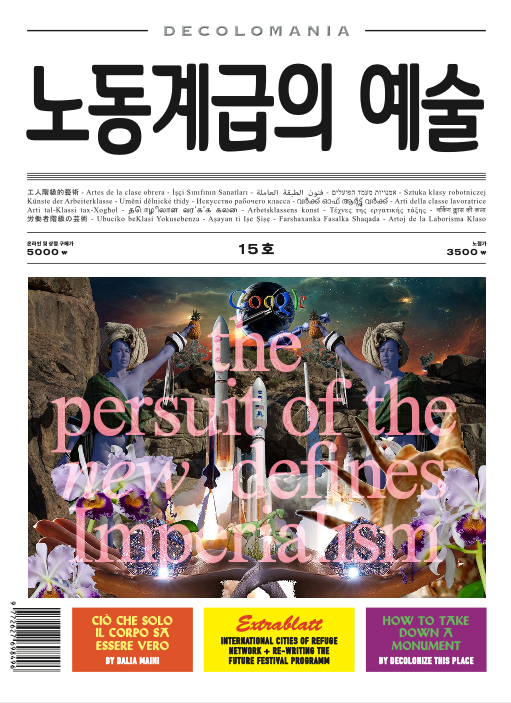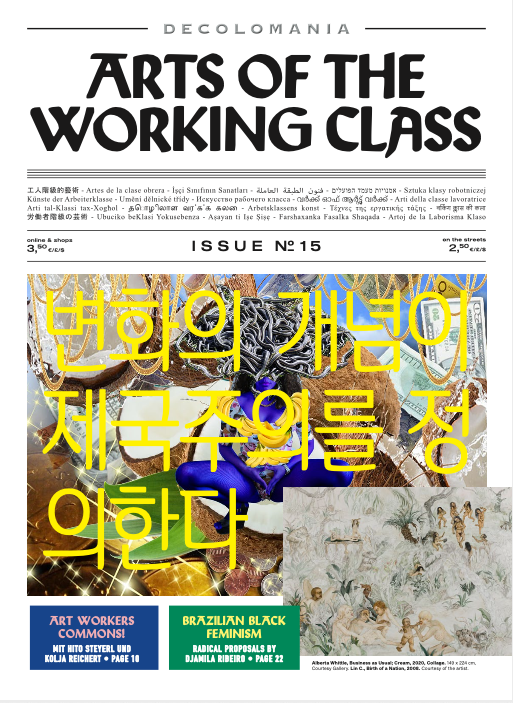Text dedicated to the last book of Félix Guattari Chaosmosis (1992), published in Arts of the Working Class #15 (Berlin) “Decolomania”

Fait à Paris (France) le 11 août 1986 à 15 heures.
Felix Guattari, Chaosmosis (1992)
For years I was attracted to the last book published by the psychotherapist and philosopher Felix Guattari because of its title, Chaosmosis, but I never managed to read it. Then a few years ago I met Rachida Triki, a Tunisian philosopher, at a symposium somewhere in Germany. She told me that she had just re-read it and that she had been astonished by its relevance to today’s world. She said “re-read” because she was about 70 years old at the time and was therefore part of that generation that had felt it necessary to read all of Deleuze and Guattari’s books. Her comment was: “Guattari had already understood everything!”.
Influenced by her enthusiasm, I hurried to look for the book in its original language. It was almost impossible to find because it was out of print and never reissued. However, by the happiest of chances, I finally found it a few months later in the book collection of my late father-in-law, an artist and teacher at an art school in France, who worked from the 1970’s until his death seven years ago. He died at exactly the same age as Guattari. Finding Chaosmosis in the family house seemed to me to be yet another sign that this book had marked a whole generation from May 1968, and that it had served as a compass for artists, teachers and psychoanalysts.
In Chaosmosis, Guattari is interested in the forms of subjectivation (i.e. the fabrication of subjectivity)–which he considers as always artificial, whatever the era–especially those produced by machines like computers, but not only. This book is inseparable from Guattari’s work with Deleuze and goes against any attempt to liquidate subjectivity that can be found in scientific approaches or universalist and colonialist ideologies, whether they come from the West or the East. Guattari himself says that he is setting up an aesthetic paradigm that would oppose the scientific-scientist paradigm for thinking about subjectivity. By aesthetics, we must understand that below the oral, the scriptural, the gestural, the postural or the “plastic”. The aesthetic paradigm designates something that would bring us back to a chaos both original and final, a heterogeneous power capable of allowing us to redefine and appropriate the infinite possibilities of the factory of subjectivity.
Following in the footsteps of Deleuze and Foucault, Guattari does not rely on a concept of the subject whose boundaries would be impervious, and by definition fixed, but rather on a subjectivation envisaged in terms of flux, flow, movement, intensity, mutation and polyphony. Guattari borrowed the word “polyphony” from the Russian philosopher Mikhail Bakhtin, author of The Poetics of Dostoevsky from 1929, in which he analyzes the polyphonic nature of the Dostoevskian novel and its metaphysical, aesthetic and political implications. The capitalist world is a place of struggle, a market where not only objects and wares find themselves in permanent competition with each other, but also narratives, dialects, languages, rhythms, myths and visions. Rather than arriving at a unified image of the world, with Bakhtin we are witnessing a plural representation of so-called reality: as fragmented and sometimes even contradictory, like a cubist painting. This concept of “polyphony” is of particular interest to Guattari because it allows us to depict very precisely what he calls “the competition of subjective economies”.
When Guattari wrote Chaosmosis in 1992, the Berlin Wall had just fallen. At the same time, Francis Fukujama diagnosed the “end of History”, that is, the end of a struggle between ideologies, thus ensuring the supremacy of the universal consensus that liberal democracy would become. A year before Derrida’s famous 1993 book Specters of Marx: The State of the Debt, the Work of Mourning and the New International, Guattari already worries in Chaosmosis about the disappointments that the populations of Central and Eastern Europe will experience when they are imbued with triumphant capitalism. Whether it is the situation in China, Iran, the United States, Poland, Hungary, the Arab countries or Western Europe, Guattari observes a phenomenon of extreme complexity since it “intermingles emancipatory aspirations with retrogressive, conservative – even fascist – drives of a nationalistic, ethnic or religious nature”. In addition to the political and social crisis, the ecological crisis is inseparable: “With the fading antagonisms of the Cold War, we enter a period when serious threats, posed by our productivist society to the human species, appear more distinctly. Our survival on this planet is not only threatened by environmental damage but by a degeneration in the fabric of social solidarity and in the modes of psychical life, which must literally be reinvented. The refoundation of politics will have to pass through the aesthetic and analytical dimensions implied in the three ecologies – the environment, the socius and the psyche.”
Guattari wanted to modernize psychoanalysis, the one inherited from Freud, but also the one reformed by Lacan. He wanted to leave behind the dominant schema inherited from structuralism, which places the binary linguistic model (signifier/signified) at the basis of its individual reading of the unconscious, which is also placed in a dualism between conscious/unconscious. The unconscious, but also signs in general, are according to Guattari much more heterogeneous, contradictory (schizo) and polyphonic. They are connected to preverbal intensities, that is to say they are collective, cosmic and political. Guattari’s theories were elaborated in connection with his practice as a psychotherapist at the Clinique de la Borde, where he worked until his death. Founded by Jean Oury, a representative of institutional psychotherapy and a student of the Spanish anarchist psychiatrist François Tosquelles, the Clinique de la Borde was a breeding ground for institutional criticism, psychiatry, political struggle and ecological thinking. At the origin of this movement is the founding experience initiated by Tosquelles during the Second World War at the psychiatric hospital of Saint-Alban in the South of France, where Frantz Fanon and others were trained. According to this experience it is a question of first treating the hospital in order to be able to care for patients because this institution is crossed by a representation of power–in the doctor/patient relationship, but also between the different grades of caregivers–of an authoritarian essence and is therefore also toxic for the psyche. The hospital thus becomes a political laboratory for thinking about the revolution of society.
Guattari’s thought took on ever greater importance for artists, theorists and curators, following the example of Nicolas Bourriaud whose famous 1998 book L’Esthétique relationnelle drew abundantly on Guattarian “ecosophy”. In retrospect, Guattari’s books appear to be visionary, even if he was expressing huge concerns shared by many people at that time. In The Three Ecologies, Guattari already spoke in 1989 of Trump as a parasitic algae applied to the real estate sector: “the freedom of proliferation left to men like Donald Trump, who are taking over entire neighborhoods in New York, Atlantic City, etc., is a real threat to the environment, to “renovate” them, increase rents and at the same time drive out tens of thousands of poor families, most of whom are condemned to become “homeless”, the equivalent of the dead fish of environmental ecology”. Today, almost a year after the globalized world was ravaged by the Covid-19 virus, only a couple of weeks without President Trump as the head of the US, we are witnessing the hyper acceleration of phenomena already clearly observed 30 years ago.
Clara Pacquet, February 2021


